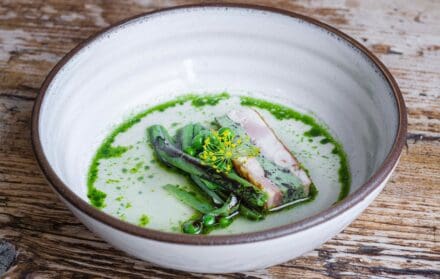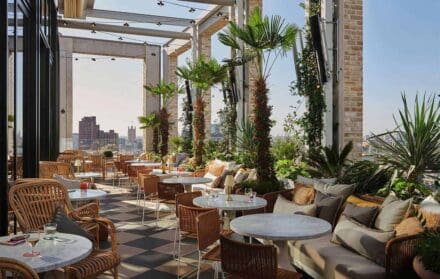
Meet the chef: James Knappett of Kitchen Table
With tenures at some of the best restaurants in the world under his chef’s hat, James Knappett created his own unique dining concept more than a decade ago. We discover why it’s aged like fine wine
Becoming a chef requires diligence, prowess, enthusiasm, resilience – and a large splash of boldness. And while James Knappett, chef patron and co-founder of the two Michelin-starred Kitchen Table, has all of the above, it was the latter that likely secured his first-ever job in a professional kitchen at Restaurant Gordon Ramsey. “I met Gordon by chance in a hotel and asked him, ‘How do I get a job in your kitchen?’,” he explains. “He told me to turn up at the back door, so that’s what I did. I got the train into London… and knocked on the restaurant’s back door.” And, long story short, that’s how he started his star-studded culinary career.
Now for the long story. Born in Soham, Cambridgeshire, Knappett had an interest in cooking from an early age, attending catering college before moving to London and landing formative positions at the aforementioned Restaurant Gordon Ramsay, The Berkeley and The Ledbury. After leaving city life behind to relocate to Rick Stein’s The Seafood Restaurant in Padstow for three years, Knappett then ventured further afield in 2005 to undertake roles at Thomas Keller’s renowned restaurant Per Se in New York and the world-famous Noma in Copenhagen. Quite the CV, I’m sure you’d agree – so what can possibly come next when you’ve worked at some of the best restaurants in the world? You set up your own, of course.
In September 2012, Knappett and his wife, sommelier Sandia Chang, opened Kitchen Table in Fitzrovia. Within two years it was awarded a Michelin star, followed by a coveted second star in 2018. Today, it’s a stalwart on London’s starry scene. Combining kitchen theatre, Japanese-inspired interiors and delectable tasting menus (which fetch up to £250 a head), Kitchen Table is not just an evening out, but an immersive dining experience you won’t forget in a hurry.

Images: Marcus Cobden

James Knappett with wife Sandia Chang
Using meticulously sourced, seasonal British ingredients, each day Knappett and the Kitchen Table team prepare a new tasting menu using the very best of what’s available to them that day. Each course focuses on a single ingredient – such as oyster, caviar, scallop, or lamb – and amplifies exceptional produce to its very best. Think Parker House rolls and turbot roe, lamb with beach rose, yoghurt and black garlic, and strawberries drizzled in meadowsweet honey and served with rice pudding and Tahitian vanilla – all created before your eyes and served around a 20-seat kitchen table. It’s this intimacy, not only with the chefs but with fellow diners, that makes the Kitchen Table experience so unique.
More than a decade after he opened his two Michelin-starred restaurant, Knappett reveals how he manages the workload of daily-changing tasting menus, the best dish he’s ever made and his plans for 2024.
As a child, I wanted to grow up to be a policeman. I probably watched too many movies – it was the 1980s, so films like Die Hard and Police Academy were popular. Toys and how kids played were also different with lots of cops and robbers going on. There was no real interest in food until much later on, once I’d finished school.
A prawn cocktail sandwich. I remember this from when my sister was born. My dad took us to the hospital to see her and my mum wanted those sandwiches. Just prawns, ketchup and mayo on bread and butter – that’s how they used to be done.


The main thing we wanted to create was an immersive, interactive dining experience with seasonality at its core. We also designed the restaurant with ‘kitchen theatre’ in mind, to allow our chefs to showcase the work and passion that goes into each dish. We all start prepping for service in the early morning, and our set-up means we get to see the food being enjoyed each night. This makes it more like how we host a dinner party at home – the kitchen is the room where everyone usually gathers, to eat, chat and be hosted in one place. Not separating the dining experience from the kitchen also means we’re able to really explain our work.
It felt amazing. As a team we’re always striving to be the best, and those awards are something we pick up along the way to recognise how hard everyone works. We won those stars by doing what we do and being who we are, so while there’s pressure to keep them, it’s not something we actively think about. We just have to carry on and keep pushing to do better.
As a chef, it’s being able to cook to feed people. The way the restaurant is designed means we get to interact with our guests, which is our highlight.
As a guest, I’d say it’s the whole experience. We’ve carefully thought about and designed the meal so that from the second you arrive to the minute you leave, the whole thing – including the service, the drinks and the food – should be the highlight.
I chose this format as it allows us to showcase a wide variety of techniques and ingredients. I’m also really passionate about the four seasons we get to experience here in the UK, which provide a key source of inspiration for our tasting menu. We always think about what’s available to us. For example, there’s a lot of apples and pears around and from there, we are able to create something exciting with them.

Turbot with foie gras and onion. Turbot is an extremely precious fish, and when I cooked at Rick Stein’s restaurant, we’d cut it off the bone and serve it with hollandaise. At Kitchen Table, we elaborated on this – gently cooking the fish in foie gras fat, before adding a raw slice of foie gras on top to complement the turbot’s richness. To garnish, there are spring onions pickled in sherry vinegar and, right at the back, a herbaceous salad with chickweed, three-cornered garlic flowers and stinging nettle flowers. To finish, we pour in a consommé of onions, split with an oil made of fresh thyme leaves. Within all that, you have a history of my cooking journey with Per Se in the precision, refined elements and unique flavours; things I learned at Noma in its foraged salad and minimalism; and finally the fish from Rick Stein’s as well. All three of those kitchens inspired this dish, which makes it one of my favourites.
I would still want to be a policeman, but part of a SWAT team or something like that.
In 2024, we’re looking to kick off the year with a few new colleagues. We’re really, really excited about this, as new staff mean fresh ideas. And we have the same goal for every year, which is that by the time it ends, we have done better than the one that came before. We ensure we’re constantly evolving by always pushing to find the best ingredients and ways of marrying them together to deliver food and drinks of the highest quality.
Tom Spenceley at The Ledbury is at the top of my list. We worked together closely for five years and now I watch him run a different kitchen through social media. He was a great cook when he was at Kitchen Table, and he’s really coming into his own.
I’m also impressed with Nick Tannett at Evernight, who often goes by ‘Borage’ – a nickname he earned by foraging so much of the herb. He also worked with us at Kitchen Table and has a great mind for peculiar flavours that really pair together. Now he’s running his own show, but seeing him mix his foraging skills with Japanese cuisine is really cool. He’s a great human.

One of my favourite spots is Acme Fire Cult in Dalston. Here, Andrew Clarke and Daniel Watkins not only punch hard with flavours but cook consciously with low waste, using fermentation and by-products. The vibe is always fun, cocktails are great, and come rain or shine it is a perfect weekend place to hang out with the family. Expect chargrilled sourdough with marmite butter and pecorino cheese to start, and then fill up with grilled dry-aged beef chops with smoked bone marrow.
Visit kitchentablelondon.co.uk






